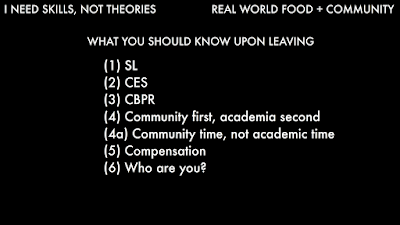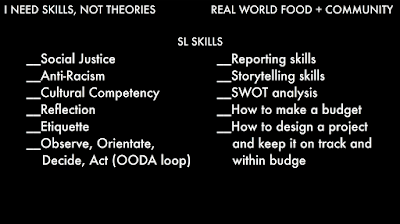2018. A workshop given at the Fourth Annual Local FoodStorm responding to college students’ interests in connecting to refugee and immigrant communities and their food traditions.
Community health worker at a dental clinic with her neighbors: How they might operate in this situation.
Say the words "service learning", "research" and "passion" and to most listening heads the words don't stick together, whether you're a college student or faculty member, whether you're a community activist or food enthusiast. But all of us — long term residents and short term visitors — are fortunate to live in the middle of a local food storm, a hurricane of opportunities and developments that we can treat as feel-good DIY hobbies or channel into real change for society’s benefit. And if academics speak an exclusive language that most community members would be challenged to understand, our area colleges and universities have the resources, experts and organizational structures to harness a lot of the food storm's energy and address serious community problems like food insecurity, preserving food and agricultural traditions or promoting neighborhood health and wellness. Youth of color, refugees and immigrants, marginalized and underserved communities all have leading roles to play. But whether it's designing an IRB approved community-based participatory research project or running a successful community urban food garden, everyone of all colors and identities has to have skills. In this workshop we'll run through a checklist of skills you need to practice and master depending on where you're coming from and walk you through how others (in academia and in communities) did it.
Title screen
I hope to cover all this in a few minutes...
How a cooking demo at UNCA turned into a powerful story about a refugee woman’s escape to America. Spring Roll Recipe https://youtu.be/ZeXejzE8SS4
In academia, relative terms used to describe activities.
From the public health perspective, how food matters as a cultural expression.
Learning how to stand back and observe first, discerning the "rules" of the game or prevailing beliefs and values of the community you seek to work with.
And, in the chess example, being able to see a situation from the other’s view.
Fundamental skills and how they relate to one another in practice.
Neighborhood organized dirt giveaway: How they might operate in this situation.
LEP refugee farmers selling at the farmers' market: How they might operate in this situation.
Community health worker at a dental clinic with her neighbors: How they might operate in this situation.
Long term, overlapping projects
Male community leaders
Mothers proposing their own group to a funder
Community members directing where to locate raised garden beds.
Compensation can mean money, recognition, awards, but it must acknowledge the value of a community member’s time and skills.
Service Learning: Different academic activities require different skills to master.
Community-Engaged Scholarship
Community-Based Participatory Research
Review
Q+A





















